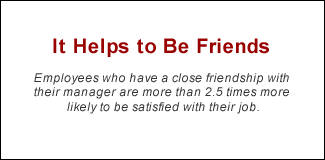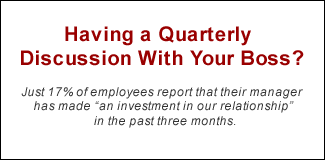When compared to time spent with relatives, children, customers, colleagues, or bosses, time spent with friends is rated as being the most enjoyable, according to a recent study. On average, time spent with a friend ranks even higher than time spent with your spouse. How could that be? The Princeton researchers who conducted this study used a novel technique: Participants were asked to reconstruct their day, allowing researchers to pinpoint specific moments. Participants also reported their overall enjoyment at each moment. For example, if you were in the midst of rushing your daughter to school or changing your son's dirty diaper, you might have been asked to report how happy you were at that moment. In contrast, you might have been asked to recall a moment with a friend when you were relaxing or having a drink together.
Perhaps most concerning was the bottom of this "people we enjoy being with" list. Clients and customers were third from the bottom; coworkers were second to last, followed by bosses, who were dead last. Interacting with the boss was also rated, on average, as being less enjoyable than cleaning the house.
Undoubtedly, there are thousands of managers in the workplace who have no business bearing the responsibility for developing other people. Most of us have had a boss like this at one point or another. They make you miserable, less productive, and even diminish your physical health. But we have also found thousands of exceptional managers who have the opposite effect, and they have something in common: These great managers care about each of their employees as a real human being, not just a means to an end.
When I spoke with employees who reported to Sandra, one of the highest rated managers we have ever studied, what amazed me was the variety in their descriptions of what she did best. It sounded as if they were talking about different people. One of Sandra's employees who did not need or want to be micromanaged told me that Sandra was the first manager who had given him "room to roam." Sandra was there for him, but she never looked over his shoulder on a daily basis.
In direct contrast, another one of Sandra's employees described how much she appreciated the way her boss "stopped in all the time to see how I was doing." She said, "I loved having a boss who cared about my family and was interested in me." This enabled her to get more done on the job. Apparently, this employee wanted and received regular attention.
 |
Herein lies one of the secrets we have learned from top managers (and from great teachers, for that matter): They get to know each person as an individual, and they tailor their management to each employee's preferences.
We want and need managers who care about our lives beyond the workplace. 优蜜传媒has asked more than eight million people to respond to the statement "My supervisor, or someone at work, seems to care about me as a person" and has found that people who agree with this statement:
- are more likely to stay with the organization
- have more engaged customers
- are more productive
 |
If you're fortunate enough to have had a manager who treated you like a friend and cared about your personal life, you probably understand the difference this type of genuine friendship can make. The best managers in the world are not only experts in systems, processes, and technical competencies -- they are experts in your life. And, because of this, they increase your engagement and productivity at work.
All employees deserve a manager whom they can truly call a friend, or at least a manager who cares about their general well-being. The bottom line is that we spend roughly 50% more time with our customers, coworkers, and bosses than we do with our friends, significant others, children, and other relatives combined. If you want to be happier and more engaged at work, consider developing a few strong friendships at the office, maybe even one with your boss.
